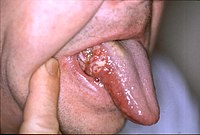
Photo from wikipedia
Introduction Dental visits may provide an opportunity to counsel and screen for chronic disease prevention. However, few studies have used nationally representative data to assess the potential role of dental… Click to show full abstract
Introduction Dental visits may provide an opportunity to counsel and screen for chronic disease prevention. However, few studies have used nationally representative data to assess the potential role of dental professionals in chronic disease prevention. We examined the percentage of US adults who reported chronic disease counseling and screening by dental professionals. Methods We analyzed data from the National Health and Nutrition Examination Survey 2011–2016 for 5,541 participants aged 30 or older who reported seeing a dental professional in the past year and estimated the percentage who reported receiving counseling about selected chronic disease prevention during the visit. We used logistic regressions to examine associations between risk factors and counseling. Results Overall, 4.0% (standard error [SE], 0.3) of adults were told by a dental professional about the benefits of checking blood glucose, 42.4% (SE, 2.9) giving up tobacco (among tobacco users), 26.6% (SE, 1.2) about checking for oral cancer, and 43.0% (SE, 1.8) had an oral cancer examination. Groups with risk factors were more likely to receive health behavior counseling than those without (eg, those previously told they had diabetes risk factors were more likely to receive blood glucose counseling than those without [8.1% vs 3.3%, P < .05]). The pattern for oral cancer counseling and receiving an oral cancer examination was different: adults without oral cancer risk factors (no tobacco use, normal/underweight, and/or excellent/very good health) were more likely to receive oral cancer counseling or screening. Adjusted analyses did not change these associations. Conclusion Most adults were not counseled about chronic disease prevention during a visit with a dental professional. Current tobacco users and those with overweight or obesity were more likely to report receiving counseling.
Journal Title: Preventing Chronic Disease
Year Published: 2020
Link to full text (if available)
Share on Social Media: Sign Up to like & get
recommendations!